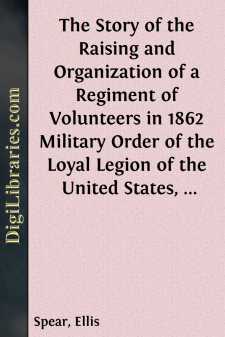Categories
- Antiques & Collectibles 13
- Architecture 36
- Art 48
- Bibles 22
- Biography & Autobiography 813
- Body, Mind & Spirit 142
- Business & Economics 28
- Children's Books 17
- Children's Fiction 14
- Computers 4
- Cooking 94
- Crafts & Hobbies 4
- Drama 346
- Education 46
- Family & Relationships 57
- Fiction 11829
- Games 19
- Gardening 17
- Health & Fitness 34
- History 1377
- House & Home 1
- Humor 147
- Juvenile Fiction 1873
- Juvenile Nonfiction 202
- Language Arts & Disciplines 88
- Law 16
- Literary Collections 686
- Literary Criticism 179
- Mathematics 13
- Medical 41
- Music 40
- Nature 179
- Non-Classifiable 1768
- Performing Arts 7
- Periodicals 1453
- Philosophy 64
- Photography 2
- Poetry 896
- Political Science 203
- Psychology 42
- Reference 154
- Religion 513
- Science 126
- Self-Help 84
- Social Science 81
- Sports & Recreation 34
- Study Aids 3
- Technology & Engineering 59
- Transportation 23
- Travel 463
- True Crime 29
The Story of the Raising and Organization of a Regiment of Volunteers in 1862 Military Order of the Loyal Legion of the United States, Commandery of the District of Columbia, War Papers 46
by: Ellis Spear
Description:
Excerpt
Heretofore papers which have been read before this Commandery have related to personal reminiscences of campaigns and battles, with all the interest which accompanies the personal element in such affairs. The preservation of these details is of great importance, not only for the special interest which attaches to them, but because they illustrate the larger actions and will be of value to future generations, as showing the very body and features of the time. How valuable these minor matters are, we perceive plainly by the use made of them as they are found in autobiographies and diaries of former generations. The knowledge of the manner in which people lived and thought and acted in private life throws light upon public affairs and public characters. It is interesting, and not unprofitable, to know that the Father of his Country in some wrathful mood swore roundly; or that the Philosopher of the Revolution, in his younger days, trudged in the streets of Philadelphia with a loaf of bread under each arm; or, when older, was very gay and festive in the gay and festive capital of France.
I propose to continue in the same grave historical vein, but to treat of less important affairs. I propose to avoid the beaten track of campaigns, battles, marches and skirmishes, and the luxurious life of Libbey or Andersonville prisons, and going back to the beginning of things, endeavor to explain how a volunteer regiment was raised and gotten into the field, and, incidentally, perhaps, to touch upon the character of its officers and men.
The regiment of which I speak was the last to be organized in its State under the call for three hundred thousand men, made by the general Government in 1862. It was the last of that "three hundred thousand more" responding to the call of "Father Abraham," according to the popular ditty of the time. The recruiting was done by private individuals, and at their own expense, under the authority of the Governor of the State. These private individuals, as a matter of course, expected, as a reward for their labor and expenditures, to be commissioned in the companies which they might raise. That was the understanding. Doubtless, in their efforts, they were inspired by patriotism, but, as was said about the Pilgrim Fathers, that they "sailed by Deuteronomy, modified by an eye to the main chance;" so there was also, with the officers, some modification or further stimulus of personal consideration, just as with the enlisted men—their patriotic impulses were somewhat assisted by the bounty of a hundred dollars.
This method of raising troops was an effective one and inexpensive to the Government; but as it involved more or less of log-rolling amongst his neighbors, and more or less persuasion and perhaps promises in the obtaining of recruits on the part of the ambitious recruiting officer, it was not so promising for future discipline. Nor was the process of selecting line officers by their ability or success in persuading their neighbors to enlist, a severe test of military fitness. However, these considerations did not trouble the Governor nor the impromptu recruiting officer, who did not foresee them. He had no experience whatever in this line of business, and fortunately did not look so far ahead. To say that as a rule he was utterly green in military matters, is to do injustice to the words. However, he might be credited with some enterprise and even audacity, for such certainly were required in a young man given to serious reflection, who should proposed to organize a military company, and to command it in the field, when he scarcely knew a line of battle from a line of rail fence.
Amongst those raising companies were young lawyers who had perhaps learned to draw an indictment, but who would not then have been able to draw anything in the military line, unless it were rations, or the enemy's fire. There were schoolmasters whose only qualifications for getting men to the front and keeping them there, were based on experience in teaching young ideas how to shoot. There were farmers, clerks, and fellows just out of college, some graduates and some undergraduates, but with not a tried or known military qualification in the whole squad....


